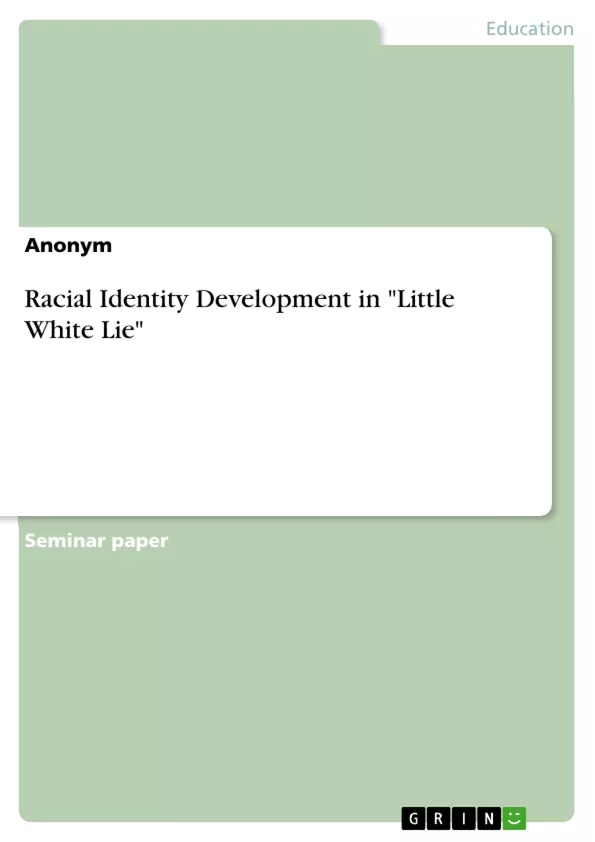This paper focuses on the documentary "Little White Lie", following Lacey Schwartz in her journey of finding her own racial identity. It examines how Lacey Schwartz's racial identity develops throughout her life, as depicted in the film. Furthermore, it will be examined in how far Cross' and Helms' theories apply to Schwartz' racial development.
Who am I? For many of us, it is an easy question to answer. We know our identity is based on our family members, especially our parents, how we look like, how people are reflecting back at us, what they see based on their knowledge of identity. We live in a society that makes us want to belong to a certain group, religion, gender, ethnicity and so on. But what about not being fully categorizable into one “box”? What about being more than one or two categories? Lacey Schwartz wonders about her own identity in her film "Little White Lie". Because of a lie, she is torn between her perfect white Jewish family and her mother's affair with a black man who turns out to be her father. This discovery is her turning point in life which ultimately throws her into a family but most importantly into an identity crisis.
But what exactly is an identity? Different fields such as cultural studies, sociology, and psychology deal with this question. There are more than enough theories about what identity can be, and how it works for us. One aspect they have in common is that many factors determine what we see as part of our identity. In the US American context, race plays an important role, and scholars such as William Cross and Janet Helms have developed their own theories as to how a person's racial identity evolves. Beverly Daniel Tatum further emphasizes that part of who we are is how others see us.
Table of Contents
- Introduction
- Racial Identity & Racial Identity Development
- White Racial Identity Development
- Black Racial Identity Development
Objectives and Key Themes
This work examines the development of Lacey Schwartz's racial identity as depicted in the documentary "Little White Lie". It analyzes how her identity evolves throughout her life and how the theories of William Cross and Janet Helms apply to her experience.
- Racial identity and its complexities
- The influence of cultural and societal constructs on identity formation
- The impact of race and identity on individual experiences
- The interplay of racial and religious identities
- The application of theoretical frameworks to analyze individual experiences
Chapter Summaries
- Introduction: This chapter introduces the topic of identity, particularly in the context of racial identity, and uses the documentary "Little White Lie" as a case study. It discusses various definitions and theories of identity, emphasizing the significance of race in the U.S. American context. It also highlights the theories of William Cross and Janet Helms as foundational for the analysis.
- Racial Identity & Racial Identity Development: This chapter defines racial identity and racial identity development theory, outlining the key assumptions and concepts. It specifically mentions the theories of Janet Helms and William Cross as foundational for the analysis of racial identity development in the U.S. American context.
- White Racial Identity Development: This chapter details Janet Helms' theory of White Racial Identity Development, outlining the six stages: Contact, Disintegration, Reintegration, Pseudo-Independence, Immersion/Emersion, and Autonomy. It provides a comprehensive overview of the characteristics and dynamics of each stage.
- Black Racial Identity Development: This chapter presents William Cross' theory of Black Racial Identity Development, describing the five stages: Pre-encounter, Encounter, Immersion/Emersion, Internalization, and Internalization-Commitment. The chapter focuses on the key features of each stage and how they contribute to the individual's understanding of their racial identity.
Keywords
Key terms and concepts include: racial identity, racial identity development, William Cross, Janet Helms, White Racial Identity Development, Black Racial Identity Development, "Little White Lie", cultural studies, sociology, psychology, race, ethnicity, social constructs, identity formation, societal dynamics, intersectionality.
Frequently Asked Questions
What is the documentary "Little White Lie" about?
The film follows Lacey Schwartz as she uncovers a family secret: despite being raised in a white Jewish family, her biological father was a Black man, leading her to redefine her racial identity.
What are the stages of Black Racial Identity Development according to William Cross?
Cross identifies five stages: Pre-encounter, Encounter, Immersion/Emersion, Internalization, and Internalization-Commitment.
How does Janet Helms define White Racial Identity Development?
Helms outlines six stages, including Contact, Disintegration, and Autonomy, focusing on how individuals perceive their whiteness in relation to other races.
How does Lacey Schwartz's identity change in the film?
Discovery of the "little white lie" creates an identity crisis, moving her from a singular white Jewish identity into a complex exploration of her biracial heritage.
Why is the role of others' perception important in identity formation?
As scholar Beverly Daniel Tatum emphasizes, part of who we are is determined by how others see us and reflect our identity back to us based on societal constructs.
- Quote paper
- Anonym (Author), 2019, Racial Identity Development in "Little White Lie", Munich, GRIN Verlag, https://www.grin.com/document/1153641



